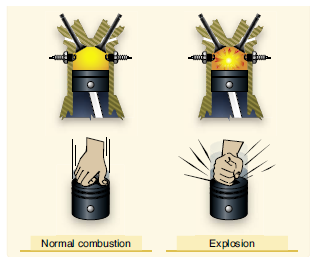Detonation, as the name suggests, is an explosion of the fuel-air mixture inside the cylinder. Under normal operation, the spark plugs each ignite a point in the fuel/air charge, which then propagate through the cylinder and provides a consistent, regulated burn in a process called deflagration. This extends the time that the burning fuel pushes on the cylinder, providing a gentle power stroke.
During detonation, the fuel/air charge (or pockets within the charge) explodes rather than burning smoothly. Because of this explosion, the charge exerts a much higher force on the piston and cylinder, leading to increased noise, vibration, and cylinder head temperatures. The violence of detonation also causes a reduction in power. Mild detonation may increase engine wear, though some engines can operate with mild detonation regularly. However, severe detonation can cause engine failure in minutes. Because of the noise that it makes, detonation is called "engine knock" or "pinging" in cars.

(Source: FAA PHAK, page 6-18)
Detonation can be caused by a number of factors, but generally they relate to a situation outside of the engine's design. Using the wrong fuel can cause detonation: the octane rating of a fuel is basically the amount of pressure it can take before it detonates. Similarly, high cylinder temperatures can cause detonation(1). This is why mixture is set very rich when at high power levels: the excess fuel cools the cylinders, preventing detonation. As noted above, full power with carburetor heat on can cause detonation, as the increased temperature mimics the effect of high cylinder temperatures. Full carburetor heat is required to provide at least a 90 degree F increase in intake air temperature.
Further reading:
1) Detonation is distinct from pre-ignition, where the fuel/air charge is ignited by something other than the spark plug. Notably, detonation and pre-ignition often cause each other, as a detonating engine will have a very high CHT (potentially enough to cause pre-ignition), and if the charge pre-ignites as the cylinder is still rising, the continued compression may cause the charge to detonate.

